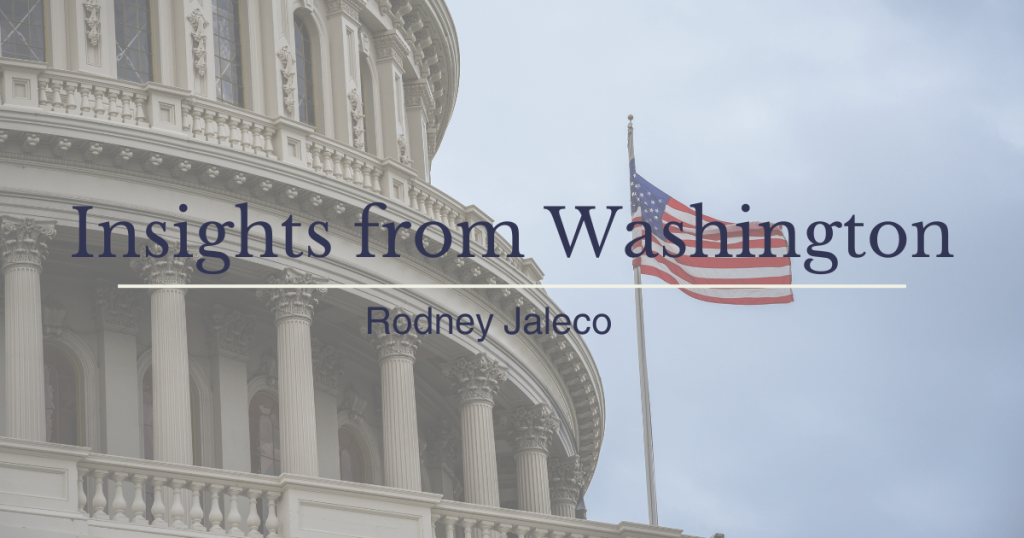Insights from Washington | DC politics upend US security priorities, raise doubts among allies

By Rodney Jaleco | Date 02-26-2024
WASHINGTON D.C. – With another funding deadline looming, the perception of a dysfunctional Washington is deepening doubts among America’s allies, especially those on the “frontlines,” about whether they can continue to rely on her promises.
Bipartisan efforts to push about $90 billion in military assistance for Ukraine, Israel, and Taiwan, earlier approved in the Senate, have so far failed to overcome a Republican blockade in the House of Representatives. Meanwhile, Congress is racing to another “fiscal cliff” as at least a third of the federal government stands to run out of money by midnight Friday (March 1), and the rest running dry a week later, on March 8.
The focus is on Ukraine – with reports a growing ammunition shortage is allowing Russian advances in the east – and Israel, where the death toll mounts, and there’s the constant threat of hostilities spreading throughout the Middle East.
But when a US congressional delegation visited Taipei on Feb. 23, they said Ukraine’s current plight was being discussed in the same breath as Taiwan’s. “The outcome there does matter for cross-strait deterrence. I’m not saying it’s decisive for it. Still, it’s at least correlated,” declared Republican Rep. Mike Gallagher, who heads the select House committee on the strategic competition between the US and Chinese Communist Party.
The proposed supplemental package earmarks $2.6 billion for Taiwan and allies like the Philippines that have figured in confrontations with China. Some $2 billion from that pot will go to replacing US-made weapons with the Taiwanese military, including Harpoon anti-ship and Stinger anti-aircraft missiles (a 2023 Cato Institute analysis pointed to a nearly $20 billion US backlog in arms deliveries – weapons Taiwan has already bought, from F-16s to M-1 Abrams battle tanks – but not yet delivered).
US commitment to the Asia-Pacific region has always been a touchy topic in both Washington and Asian capitals. After decades of escalation, the US debacle in Vietnam (1955-1975) and base closures (1991-92) in the Philippines allowed China to flex its muscles. More recently, those doubts resurfaced after former Pres. Donald Trump questioned NATO’s purpose, embraced North Korea, and levied tariffs to leverage China. President Joe Biden has worked to repair America’s alliances and recommitted the US to Indo-Pacific security, including freedom of navigation amid China’s encroachment in critical South China Sea lanes.
The Biden administration’s reassuring “ironclad guarantee” has helped buttress Pres. Ferdinand Marcos Jr. pivots from his predecessor’s alignment with Beijing to re-entwine America. Last year, the US got four additional “EDCA sites,” allowing them to deploy forces closer to Taiwan and the South China Sea – the two key areas of concern for the US military strategy to counter China.
However, this emerging security infrastructure is now operating in a cloud of uncertainty – the outcome of US presidential elections. The former president is such a disruptive force – evident in how he easily blocked Ukraine aid – that it’s raising doubts about US commitments worldwide.
“Regardless of how radical Pres. Trump turns out to be, the uncertainty created by his election will have its consequences,” Hans Kundnani wrote in the German Marshall Fund, a DC-based think tank.
The uncertainty and doubts it engenders are relevant only in how the major players read the tea leaves and act accordingly, leading to the US elections in the Fall. Pundits are torn. The Foreign Policy’s Agathe Demarals writes, “Given Trump’s incendiary rhetoric about Beijing—including his promise to escalate the US-China trade war—it is easy to believe that Chinese leaders would prefer incumbent President Joe Biden over Trump, who will likely be the Republican Party candidate. Yet this view is probably shortsighted, and it eclipses the broader picture. In all likelihood, China is rooting for Trump.”
Reuters reported that Japan has been trying to engage with “people close to Trump in recent weeks” to dissuade any deal with China. If he succeeds, there is a fear that Trump could cut a modus vivendi between the world’s two top economies that may sacrifice Taiwan and dismantle the security network the Biden administration’s been building the last three years.
Expect Beijing to heighten rhetoric fueling precisely the image of uncertainty and chaos raging in Washington. They realize that politics – to paraphrase the adage, is not always local, especially in the US. In this nation, at least, politics have a way of spelling life and death.
Tags: Politics
